Publicación del último número de la revista escolar OLA18
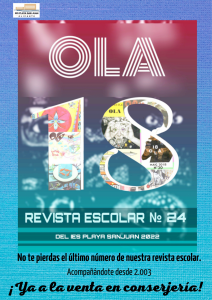
Un año más os presentamos la revista escolar OLA18 para que la disfrutéis y podáis conocer toda la actividad que se ha realizado en el centro a lo largo del curso 2021-22. Desde sus inicios, en diciembre de 2.003, la implicación en este gran proyecto de centro por parte del profesorado y el alumnado ha sido constante. El alumnado ha participado en su edición, con mucha ilusión y dedicación, a través de trabajos y artículos en los que han reflejado su visión del mundo, sus vivencias e intereses personales.
Esta última edición, la número 24, es muy especial. No solo incorpora una selección de los artículos más destacados del último curso escolar, sino que además incluye artículos de los dos cursos anteriores, que no pudieron ser impresos debido a la pandemia, y un especial dedicado a la mayoría de edad de nuestra revista con la selección de 18 artículos (uno por año cumplido) de toda la historia de Ola18.
Podéis adquirir la revista en la conserjería del centro a un precio simbólico.
Esperamos que os guste.
¡JUNTOS DESDE 2003!
Testimonios
“Cuando nos llega y abrimos el sobre, el primer olor que sale de dentro e inunda nuestra pequeña redacción es el de la mar inmensa… de emociones, ilusiones, trabajo, lucha, sueños, locura y sensatez que contiene. Toda la vida bogando en un barco de papel.” (Ola18, nº 14, p. 59).
Salustiano Fernández, Coordinador de La Mandrágora, revista escolar del IES León Felipe de Benavente (Zamora), ganadora del Premio Lobo a la mejor publicación escolar del curso 2009-2010.
“…Ola18, la revista que recibo todos los años y que cada año se supera a sí misma” (Ola18, nº 14, p. 63).
José Antonio Sanduvete, Coordinador de La revisteta, revista escolar del IES La Creueta de Onil.
“Educar en y para los medios no debería ser una asignatura. Es algo mucho más importante. Por eso necesitamos más revistas como Ola18 y centros como el IES Playa San Juan de Alicante”. (Ola18, nº 14, p. 64).
José Manuel Noguera, Director del Departamento de Ciencias de la Comunicación de la UCAM.
THE PAINTING
Last night I took me a long time to fall asleep because of the sinister look of the man in that painting.
This morning I realized that it was not a painting. It was a window.
Julia Encarnación del Barco
THE SUICIDE PILOT
The pilot was determined. He was going to kill the entire crew while the plane descended rapidly. He had never had suicidal temptations but when he saw through the cameras how they were devouring each other… He could not allow it to spread throughout the world.
Jorge Moreno
THE DEAD SON
The police found my son in the forest and they brought him back home. But he wasn’t my son. I know that he isn’t my son because I killed him and buried him in the forest.
Pedro Moreno

JUST WONDER
She woke me up with a smile on their face. I asked: “Are you dead?” She answered: “Are you?”
Marina Rodrigo
MY MUM SINGS
Yesterday I heard my mom singing. The problem is that she died last week in the bathroom when she was singing.
Hugo Hernández
THE SPOOKY NIGHT SHADOWS
It was 3 a.m. in the morning when I woke up and I started seeing some shadows on the walls, cupboards, in the ceiling, …. I was afraid but I got up and turned the lights on. And when I turned them on I saw my friends trying to play a prank on me!!!!
Lorenzo Escanciano
YOUR BED
If you’re not afraid, remember I’m under your bed…
Mateo Jimenez
DEPARTAMENTO DE INGLÉS. El pasado viernes 19 de noviembre el departamento de Inglés entregó los premios del concurso de puertas terroríficas y de historias de terror. Durante el segundo recreo los alumnos de 2ºESO B, 1ºESO G y 1ºESO D recibieron el galardón de las puertas más escalofriantes. De este modo, los alumnos pudieron apreciar lo gratificante que es un buen trabajo en equipo. En el tercer recreo pasaron a recoger su diploma los alumnos de PR4, 3ºESO E y los ganadores del concurso de redacción, David Guirao Pau (1r premio, 4ºESO A) y Valentina Guerrero Revello (segundo premio, 4ºESO B).
El departamento de inglés agradece a todos los grupos participantes las gran implicación mostrada en la actividad. Como dijo John Updike, “cualquier actividad se vuelve creativa cuando su artífice se preocupa por hacerlo bien o mejor”.
Ojalá no tuviéramos que recordarlo más. Por todas las que ya no están, las que quedamos seguiremos luchando.
Alumnos de PR4 han colocado las sillas vacías con lo nombres de cada mujer asesinada este año.
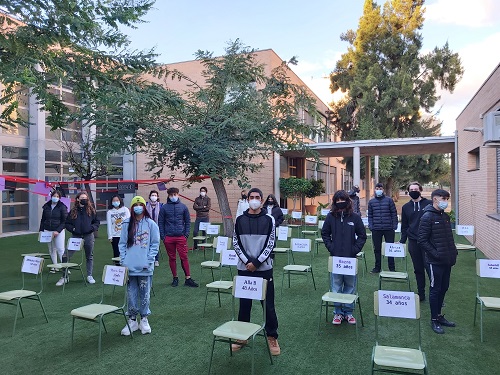
Alumnos de Bachillerato de Artes y de Artes Escénicas Nocturno han elaborado los carteles y los lazos.
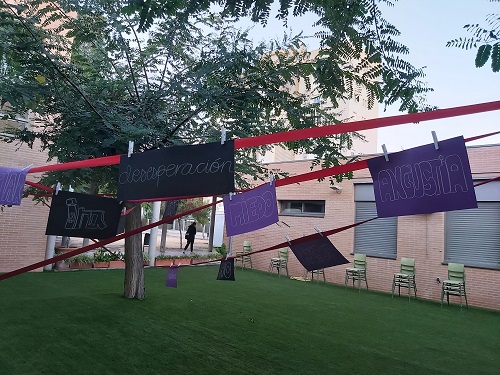
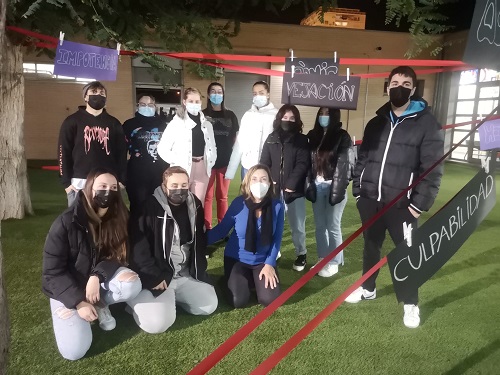
Alumnos de TEG de 2º de BAC Artes han realizado estos paneles
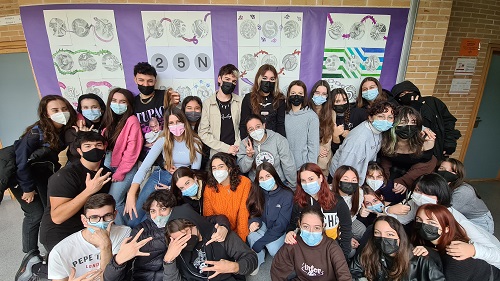

Alumnos de Artes Escénicas de 4º de ESO, esta triste pirámide
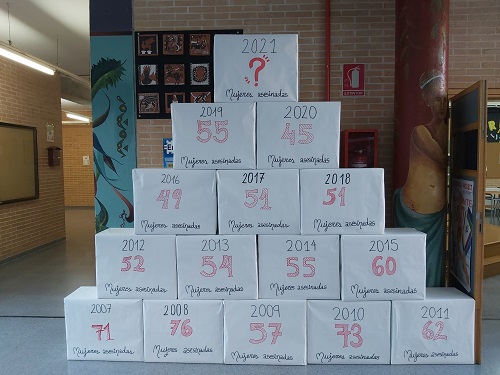
Han participado las profesoras María José García, Maria Josep Colomina, Marian Gallar, Fernanda Taba, Anna Betlem Baeza y María Álvarez.
Los alumnos de 4º de ESO D y E lo han conmemorado elaborando este cartel
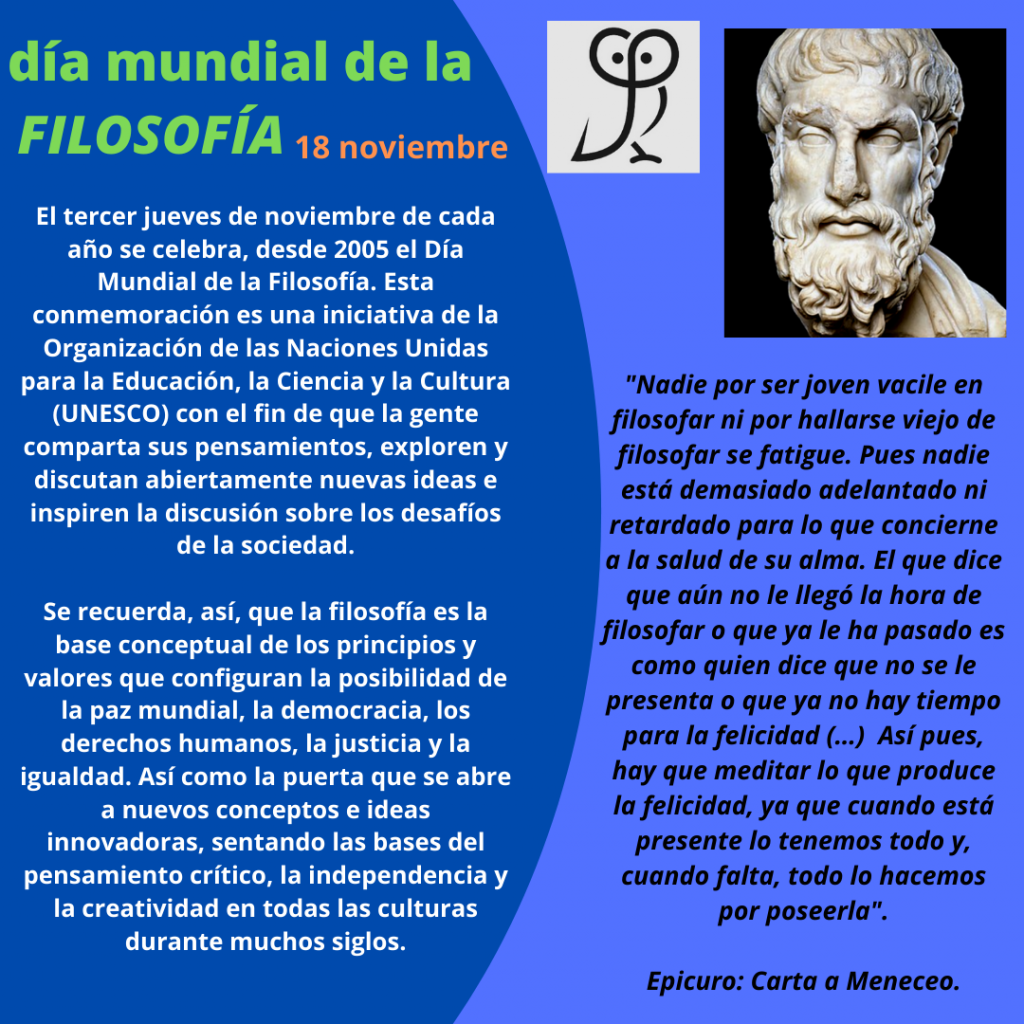
Valentina Guerrero Revello 4ESOB – Ghost story
One dark and rainy day, while I was walking through the woods, I heard a strange noise behind me. When I turned around, I didn’t see anything, so I calmed down… It was probably just a branch. I kept walking until I heard a bush moving. I was curious about what was hiding behind the bush, so I decided to approach it…
First one step, then another one, and another one, and another one… And while I was just about to give the last step, a happy little squirrel ran from behind the bush. «Just a little squirrel», I thought to myself while I continued heading to my destination, but… Wait!, what destination? Where am I going? What am I doing in the middle of the woods?
I couldn’t remember anything and I was starting to feel really dizzy… Suddenly, all I saw was black. When I woke up, all I knew was that I had to get out of there, so when a couple of tourists were heading my way, I saw my opportunity. I started to explain my situation, but they passed right through me!
They couldn’t see nor hear me. Desperate, I tried to communicate for hours with no result. Hours became days, days became months, months became years and years became centuries…
CARLA MALPICA, 2º BAC N.
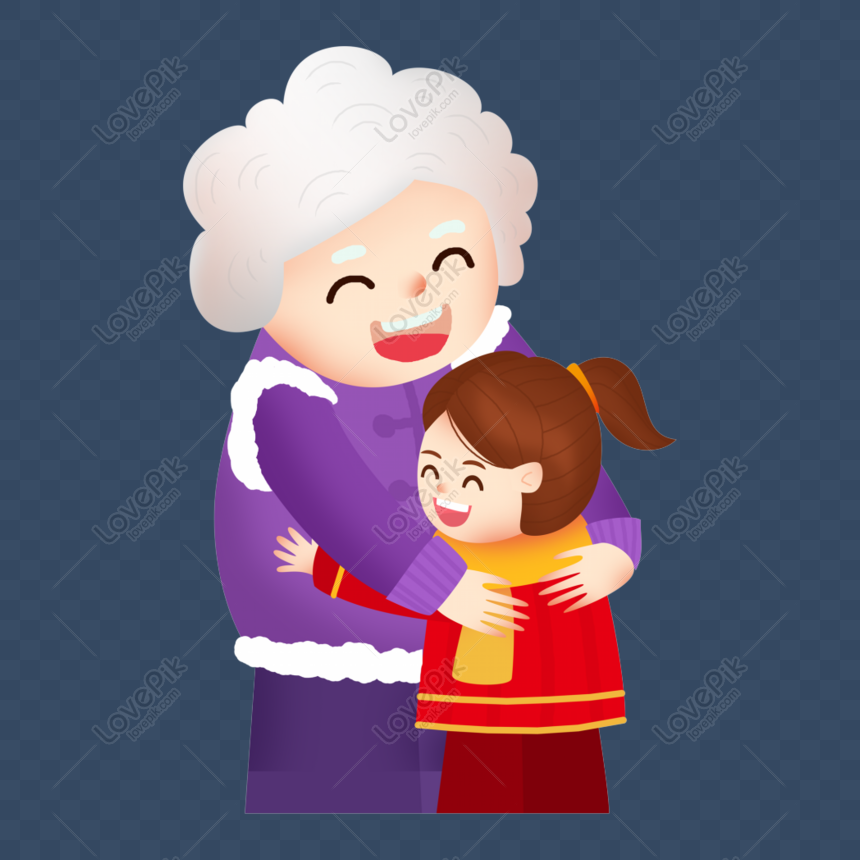
Mi abuela decía que el mejor remedio para un constipado era poner cebolla en la planta de los pies. Curiosamente, siempre funcionaba ese remedio casero tan tosco. Era tal la obsesión de mi abuela con lo natural, que cayó en el fraude que le costó la vida; la homeopatía.
La pobre abuela Elvira padecía diabetes. Acabó cayendo en la red de la homeopatía por sugerencia de una amiga suya, que falleció poco antes que ella. La abuela Elvira sabía coser, guisar, y tenía un don para la jardinería. Pero nunca fue una mujer de ciencia, por lo que no cuestionó la terapia que le proponían.
Mi abuela falleció, su amiga también, y apuesto a que hay muchos más casos de los que nadie hablará nunca.
Nadie hizo nada al respecto. No hubo noticia, ni siquiera castigo. La abuela Elvira murió por culpa del «efecto placebo», y nadie hizo ni hará nada.
¿Y tú qué opinas?
The creature in my sleep
by David Guirao, 4th ESO
I have a fear of sleeping. Everytime I try, I get sleep paralysis, and everytime I do it, I see horrible things.
One night however, once I drifted to sleep, late at night… It had happened again.
I opened my eyes, and looked around the room in a panic while trying to move my body to wake up.
There’s a number of different creatures that visit me in this state, each one more horrifying than the last one.
Looking at the corner I saw it, and a terrible feeling of dread overtook me as it started to move closer… The tall, slim, dark figure, with so big eyes that they felt like they were going to pop out of its sockets at any second, was staring back with its small pitch black pupils alongside a grin that showed off a million yellowish teeth.

One step at a time, wobbling like it was going to fall over at any second, but never doing so, the creature dragged itself closer to me.
Something about the way it was moving made it look like it was already dead, and yet, it appeared to force itself to stay alive just to meet me.
I closed my eyes, praying that I would wake up soon, repeating in my head that it wasn’t real, that it was no more dangerous than a dream.
But I felt its cold, long, thin fingers wrap around my arm a few times. Then I felt weight on my chest. And then a breath as cold as death on my face.
I instinctively open my eyes and see it inches away from my face, still grinning… Its hands move to my neck and I struggle to breathe as I try to scream but nothing will come out. I close my eyes and attempt to move my toes, tongue, fingers… anything that might move and wake me up. And surprisingly, it worked. I panted as I touched my neck and looked around the room.
A wave of relief comes upon me as there’s no horrible being to be seen… But it isn’t for long as my blood runs cold again. The door to my room is open, despite me closing it before going to sleep…
Somos un grupo de segundo de la ESO, que hemos decidido escoger la optativa de «Revista escolar». Hace unos días, el equipo de redacción hicimos una entrevista a la directora. Su nombre es Aurora Arias y es una persona amable, muy elegante y que transmite confianza.
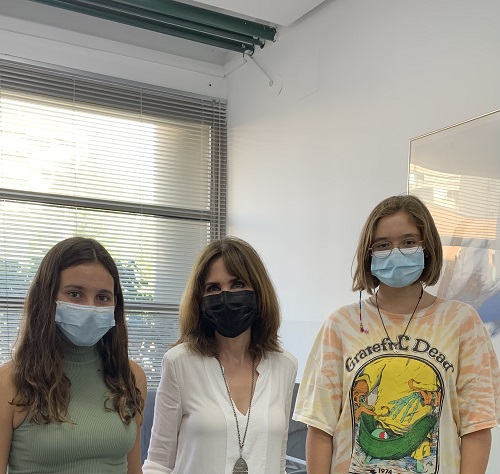
ARIANA MARTÍNEZ, DE 2º ESO F, Y LOLA MARTÍNEZ, DE 2º ESO G, AMBAS REDACTORAS DE OLA18.
OLA 18: ¿Cuántos miembros forman su familia?
Mi familia más cercana está formada por 4 miembros.
OLA 18: ¿Le gustan las mascotas?
Me gustan mucho las mascotas, de hecho tenía un perro y falleció, por lo que me puse muy triste.
OLA 18: ¿Le gusta el deporte?
Sí, de hecho voy al gimnasio todos los días, a parte de que me gusta el deporte, me gusta cuidarme, me parece esencial.
OLA 18: ¿Cuál es su mayor sueño?
Ver a todas las personas que quiero ser felices, como a mis hijas, el resto de familiares y amig@s.
OLA 18: ¿Has cumplido algún sueño/meta que te hayas propuesto o te haya hecho especial ilusión?
No ha sido un sueño ni ninguna meta pero hay algo, y es que me satisface mucho poder sacar el centro adelante, y por lo demás, quiero y tengo una vida sencilla.
OLA 18: ¿A qué lugar le gustaría viajar?
Nueva York es un lugar al que me gustaría poder viajar de nuevo, si todo estuviera correctamente para permitirme el lujo de volver. Porque la ultima vez estuve poco tiempo y me gustaría estar un mes o así para disfrutarlo bien.
OLA 18: ¿Qué le gusta hacer en sus ratos libres?
Me gusta mucho pasear y leer.
OLA 18: ¿Siempre has querido realizar esta profesión?
Yo quería ser profesora, y por las circunstancias terminé siendo directora.
OLA 18: ¿Te gusta el cargo de dirección?
Sí, me gusta mucho.
OLA 18: ¿Desde cuando eres directora en este centro?
Llevo 16 años aproximadamente en el cargo de dirección. Y antes era jefa de estudios.
OLA 18: ¿En algún momento le ha estresado el cargo de directora?
Claro, es inevitable.
OLA 18: ¿Qué es lo que más le gusta de su trabajo?
Poder resolver situaciones, poder ayudar y llevar bien el centro.
OLA 18: ¿Y lo que menos?
Lo que menos es cuando hay problemas y tienes que hablar con alguien y echarle la bronca.
OLA 18 :¿Qué clase enseñas?
Filosofía en bachillerato nocturno.
OLA 18: ¿Cuál es el libro que más le ha influido?
Me gusta mucho García Márquez.
OLA 18: ¿Recomendarías algún autor para adolescentes?
Lo que siempre recomiendo es dejar que lean lo que les apetezca para fomentar su interés y su gusto literario.
OLA 18 :¿Qué consejo darías a los estudiantes?
Yo lo que digo es que hay que pensar que todo lo que hacemos va a repercutir en nuestro futuro, porque hoy en día se piensa más en el presente.
OLA 18: ¿Es fácil ser directora?
A mí me gusta mucho mi trabajo, es complejo, porque somos un colectivo muy grande de distintas edades, con intereses diferentes. Pero la oportunidad que tienes desde la dirección de organizar las cosas, de ayudar e intentar resolver todos los problemas me parece muy interesante. Yo cuento con un equipo, el equipo directivo, que es fantástico, y todos los compañeros son geniales. Nos repartimos entre todos el trabajo y la responsabilidad.
OLA 18: ¿Que cambiarias del instituto?
Creo que deberíamos fomentar más la participación de todos los sectores de la comunidad escolar, la participación del alumnado. Por ejemplo, en el consejo escolar , que en noviembre habrá una renovación, cuando salen elecciones al consejo escolar, el alumnado no se presenta casi. Nos falta siempre número de alumnos. Creo que hay que implicar más, hacer partícipe, que sintáis el centro como vuestro, porque necesitamos vuestro punto de vista, necesitamos vuestras sugerencias y vuestras propuestas para hacerlo entre todos. Por lo demás creo que todo centro en mejorable, y vamos siempre intentando buscar más medidas que ayuden a nuestro alumnado de la mejor manera posible.
OLA 18: ¿Como se organiza el instituto para el comienzo de las clases?
¡Es complicadísimo! Nosotros estamos aquí el mes de Junio y Julio organizando, primero, desde Conselleria nos dan una serie de horas, y esas horas y con lo que vosotros habéis puesto en la prematrícula que queréis o no queréis, vamos organizando todos los horarios de los grupos, de los profesores… Todo eso es un trabajo muy complejo. Necesitamos más tiempo del que tenemos ya que es mucho trabajo. Tenemos reuniones de profesores y nos coordinamos con ellos, y si vienen profesores nuevos les daos información. Es muy complicado y mas en este centro en el que somos 1000 alumnos. Al final entre todos lo sacamos.
OLA 18: ¿Qué va a ocurrir con los exámenes de recuperación?
Ahora se están realizando las programaciones de los departamentos para decidir estos aspectos. Nosotros tenemos una orden de evaluación que lo regula. Como llevamos varios años de pandemia la situación ha cambiado, porque recordad que antes con mas de dos suspensas no pasabais, pero ahora hay alumnos que con 4 o 5 pasan, la situación es distinta. Ahora lo que queremos es que loa alumnos hagan lo mejor que puedan durante el curso. Hemos tenido una reunión con los jefes de departamentos para decidir qué hacemos con esto. No os puedo adelantar nada porque lo estamos regulando y estudiando cual es la mejor manera de que paséis el curso bien.
OLA 18: ¿Qué se estudia en los turnos de noche?
Se estudian las 3 modalidades de bachillerato: ciencias y humanidades, ciencias sociales y arte. Normalmente son alumnos mayores de edad que están compaginando trabajo y estudio. También pueden ser alumnos que en su momento dejaron de estudiar por cualquier motivo, y ahora quieren retomar los estudios. Yo doy clases en el nocturno. Normalmente tenemos para dar cabida a alumnos con una situación
OLA 18: ¿Cómo te gustaría que se impartiera la materia en las clases?
A mí me gustan las clases participativas y activas, yo entiendo las clases así, no puedo hacerlas de otra manera. Siempre intento que los alumnos piensen por sí mismos, sean capaces de expresarse (al principio les cuesta encontrar las palabras para decir lo que piensan), y razonar. Yo doy filosofía, el pensamiento crítico y activo es fundamental , y hacemos debates. La clase la damos un poco entre todos.
OLA 18: ¿Ha sido fácil para el Instituto la COVID?
Ha sido muy complicado organizar el protocolo porque nunca había ocurrido nada así y no sabíamos cómo hacerlo. En este centro fue bastante duro. Una vez que se inició el curso todos los alumnos os portasteis muy bien. Los alumnos que entrasteis en primero ayudasteis mucho y la labor del profesorado fue tan buena que todo salió fenomenal.
OLA 18: ¿Ha habido algún caso de expulsión de algún profesor?
En este centro nunca. De todas formas si se diera el caso no lo expulsa la dirección del centro, sino Conselleria. Si ocurre algún problema, piden un informe a la dirección del centro para conocer mejor la situación y luego, ya es inspección la que decide si se abre un expediente y si a ese profesor se le inhabilita o no. Pero no ha ocurrido nunca.
OLA 18: ¿Por qué está cerrada la cantina y qué podemos hacer para remediarlo?
El año pasado, Mónica, la concesionaria de la cantina intentó abrirla poniendo todas la medidas y regulándolo todo. Abrió dos semanas pero ni los alumnos ni los profesores , por miedo al contagio en las colas, entrabais. Al no vender nada la comida se le estropeaba. Entonces solicitó a Conselleria una paralización del contrato, y ellos lo aprobaron. Ella me ha dado su palabra de que en cuanto la situación mejore, la abrirá.
OLA 18: Gracias, Aurora.
Hemos querido entrevistar al Jefe de Estudios de nuestro centro porque nos parece una figura muy importante para su vida y organización. Nos hemos encontrado una persona amable, cercana y enamorada de su trabajo
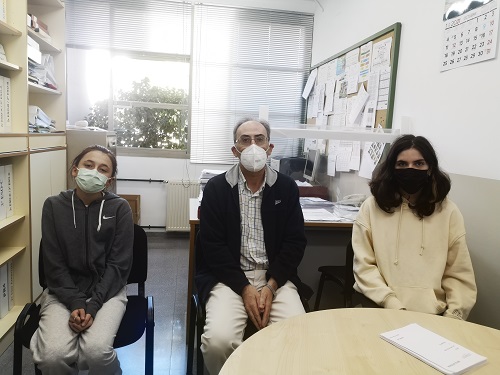
Miguel Ángel Alonso, nuestro Jefe de Estudios, entre Nerea y Sara.
NEREA BARRENA, ELISABETH CLIMENT Y SARA CLEMENTE, DE 2º ESO G Y REPORTERAS DE OLA18.
OLA 18- ¿Cuál es tu nombre completo?
-Miguel Ángel Alonso.
OLA 18- ¿En qué consiste tu trabajo?
-Mi trabajo es organizar el centro, tiene dos partes: Una que es organización entre el profesorado y el equipo directivo y otra parte que es la de convivencia y disciplina que tiene que ver más con los alumnos. También con los padres, claro, soy la persona que está más en contacto con los alumnos, con los profesores y con las familias cuando hay que avisar, ¿No? Soy la persona que, resumiéndolo mucho, tiene que resolver los problemas.
OLA 18- ¿Desde cuándo eres jefe de estudios?
-Hace… 5 años, este año va a ser mi sexto.
OLA 18- ¿Te sientes cómodo con tu trabajo y tus compañeros?
-Sí, sobre todo con mis compañeros del equipo directivo que son con los que tengo más contacto. Creo que son gente muy impresionante, tengo la suerte de trabajar con ellos.
OLA 18- ¿Has trabajado en algún otro instituto?
-Sí, he trabajado en otros institutos como profesor, pero como miembro del equipo directivo (jefe de estudios) aquí siempre.
OLA 18- ¿En qué consiste en trilingüismo y de quién fue la idea de traerlo a este instituto?
-Es imposición desde arriba, desde la Generalitat. Tenemos que cumplir las normas, hay unas órdenes que están escritas por la Comunidad valenciana, y bueno, también por la ley nacional de educación. Nosotros nos leímos la ley, vimos en qué consistía la normativa y la tuvimos que adaptar a nuestro centro, porque cada centro es distinto porcentaje.
OLA 18- ¿Cómo se organizó el Covid-19 en nuestro instituto?
-Bueno, eso sí me tocó más trabajo a mí. También me ayudó mi compañero Alejandro. Entre los dos organizamos todo el protocolo. Teníamos que usar las medidas que, en este caso, venían de Sanidad. Había que proteger a todos los profesores y alumnos del centro.
OLA 18- ¿Fue difícil?
-Fue complicado; entre el plan de emergencias que tenemos en el centro y el sistema, diríamos… “militar” pusimos medidas y formamos el protocolo. Lo asimilasteis muy bien, el profesorado lo asimiló y no tuvimos contagios dentro del centro.
OLA 18- Hay mucha gente que se va de clases sin pedir permiso “al baño”, ¿crees que eso tiene solución?
-Sí, todo tiene solución; una frase que me suelo decir cuando pienso que algo no tiene solución es: Miguel Ángel, todo tiene solución menos la muerte. Vamos a tomar medidas, aún no os puedo decir cuáles, pero tomaremos. El problema de algunos alumnos es que son muy infantiles, si todos fuerais más sensatos nos iría mejor, sé que podemos mejorarlo.
OLA 18- Nos hemos dado cuenta de que se han eliminado las FP. ¿Por qué motivo?
-Pues porque no teníamos perfil de alumno. Teníamos tres tipos de alumno: Uno era el alumno ordinario, el que sabe que es importante estudiar; otro era el alumno con dificultades, le cuesta estudiar, y necesita un poco de esfuerzo y de apoyo; otro era el alumno pasota. No le gusta estudiar. Por eso pedimos FP, pero resulta que en nuestro centro teníamos en torno a las 18 plazas y no había suficientes alumnos interesados. Esto unido a otros detalles de organización nos hizo decidir que no era conveniente tener este programa.
Ola 18- ¿Has escuchado comentarios sobre el centro?
– La fama que tenemos es de centro exigente, somos el grande, el más numeroso dicen, tenemos casi mil alumnos. Nuestro funcionamiento a los padres les gusta. ¿Qué dicen vuestros padres del instituto?
Ola 18- Mi madre está bastante contenta, ha visto que voy bien en algunas asignaturas y en otras voy algo bajita, pero que en general he mejorado así que mi madre esta agradecida al instituto.
-En este centro nos creemos la diversidad, siempre digo que a cada uno hay que darle su propia medicina, vais cambiando, pasáis de adolescentes a adultos, y en ese proceso se tiene miedos y dudas y nosotros os tenemos que acompañar, os tenemos que ayudar, mi objetivo como jefe de estudios es que todo el mundo venga aquí contento, que el instituto sea un lugar en el que yo pueda aprender y disfrutar.
Hay bastante cambio del cole a secundaria, en el colegio no tratan tanto como aquí los temas de convivencia, y tutoría. Lo que digo yo siempre es que el que lo hace bien tiene que obtener recompensas positivas y el que lo hace mal tiene que obtener recompensas negativas.
Ola 18- ¿Tú crees que en esta zona haría falta un instituto más?
-Sí, y de hecho yo lo he pedido muchas veces.
Necesitamos en este barrio un centro de formación profesional, tenemos tres con bachillerato, pero no hay ninguno de formación profesional, todos están en la zona sur o este de Alicante, pero aquí en la zona norte no tenemos ninguno, y toda esta gente también tiene que tener formación profesional de calidad.
Ola 18- ¿Tú te ocupas del a disciplina de los alumnos y además de los padres, ¿qué criterios utilizas para formar las clases?
-Sí, sí me ocupo de la disciplina, aunque no soy yo quien sanciona, la que sanciona es la directora. Yo lo que hago es informarme y comentárselo a ella, a la directora.
Y después, hay unas formas obligatorias para formar las clases, por ejemplo; tiene que haber más o menos el mismo número de niñas y niños, tienen que estar repartidos los repetidores, no pueden estar todos en el mismo grupo, lo mismo pasa con los chavales que son excelentes, tiene que ser un grupo heterogéneo, tiene que haber alumnos de todo tipo, tenéis que convivir, ese es el criterio que utilizamos.
Ola 18- ¿Ha habido problemas por este funcionamiento?
-Sobre todo por las optativas, por el problema del espacio.
Ola 18- También he escuchado que eres profesor ¿Qué asignatura das?
-Geografía e Historia, yo soy profesor y a la vez jefe de estudios. Pero doy clases más reducidas, porque claro, es muy complicado, yo si estoy dando clase no puedo atender a alumnos, atender a profesor, llamar a vuestros padres …
Ola 18- Ahora, estas preguntas son más personales. ¿Qué es lo que más te tomas en serio de tu trabajo?
-Lo que más me tomo en serio es que todo funcione.
Ola 18- ¿Estás satisfecho con el funcionamiento de este centro?
-Sí, si tengo que decir sí o no, sí.
Ola 18- ¿Tienes algún buen recuerdo en este centro?
– Muchos.
Ola 18- ¿Puedes poner un ejemplo?
-El más reciente fue ver a los chavales que yo cogí en primero de ESO después de seis años verles vestidos de traje, yéndose a la universidad.
Ola 18- ¿Qué consejo le darías a los estudiantes?
-Que no perdáis el tiempo con tonterías.
Ola 18- ¿Siempre has querido trabajar de esto?
-Desde los catorce años sabía lo que quería, cuanto más trabajo de esto más me gusta.
Ola 18- ¿Dónde estudiaste?
-En Valladolid.
Ola 18- Y por último ¿Tienes algún sueño o meta por cumplir?
-Cuando me jubile, hacer el Camino de Santiago.
Dylan ha llegado desde Canadá para cautivarnos a tod@s con su superinglés
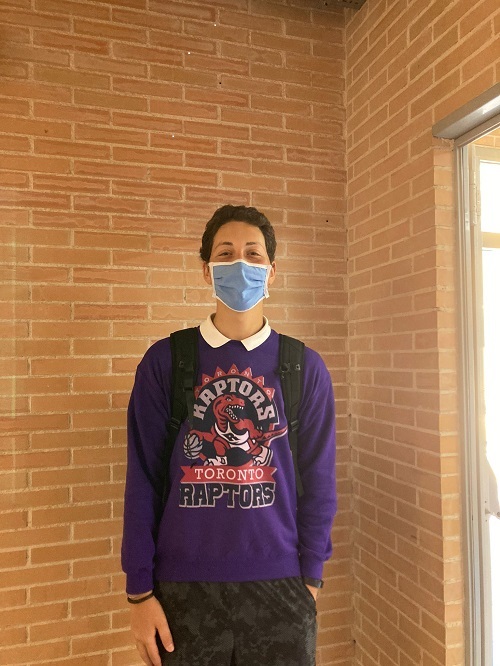
Este es Dylan. ¡¡¡Bienvenido!!! Welcome!!
By: IRIS RUIZ and LOLA MARTÍNEZ, from 2nd ESO to OLA 18
–What is your name? My name is Dylan.
-How old are you? I am twenty two years old.
-Why are you here? I’m here to teach English and help you understand your English better.
–How long are you staying? I’m here for eight months so my first day was October first and my last day is may thirty first.
–Did you teach in Canada? No, I just graduated from University in August and came here right away.
–What university do you go to? I studied in Wilfrid Laurier University, it is in Waterloo Ontario .
-Did you want to come to Spain? Yeah, I really wanted to see and kinda learn of Spanish culture and actually learn about the Spanish language
-If not what other country? Definitely anywhere in Europe, I think I would want to go to Switzerland as well.
–Have you always wanted to work as a teacher? I had always thought about it but I’m not sure if that what I want to do as a career as a full-time job but I definitely enjoy it.
–What other job would you want? Mainly a job in human resources so like a business or maybe marketing I’m not sure yet everything is still figuring out.
-Who do you live with? Right now I live by my self.
–Do you live in a building or a house? I live in an apartment near la Esela oficial de idiomas.
–Who did you live with in Canada? In university I lived with four roommates and when I’m not in university I live with my family.
–What’s your hometown in Canada? I’m from Toronto which is in Ontario, Canada.
–Do you miss anyone from Canada? Umm yeah, like my friends and family but I try to keep myself busy and enjoy the experience so I don’t think about it much.
- « Anterior
- 1
- …
- 25
- 26
- 27
- 28
- 29
- …
- 34
- Siguiente »

